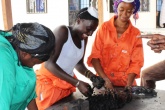British environmental engineer urges action on waste in refugee camps
A British environmental engineer has developed a mobile recycling facility to convert plastic waste into reusable bricks, which he believes can provide immediate relief to the challenging sanitary conditions and detrimental environmental impact of refugee camps around the world.
Andy Ive, of IVE Engineering, originally designed the recycling unit for the remote desert locales of the Sahara, where makeshift camps that followed the oil and construction industry were simply burying their waste material in the sand.

The facility, which is kept in a shipping container for easy transportation and durability, aims to provide a simple way to reduce the negative health and environmental consequences in what are often hastily constructed and ill-equipped refugee camps.
The mobile recycling facility is self-powered and turns plastic bottles into reusable building blocks, and comes with all the necessary equipment for segregation, compacting and recycling mixed waste at source.
Ive partnered with the Disaster Management Centre at Bournemouth University to promote the importance of waste management in emergency situations, and is now urging governments, UN agencies and NGOs to seek practical and economical solutions to improve sanitary and living conditions in temporary camps around the world.
Respite in a race to an end without sight
Commenting on the need for better management of waste in tightly-packed camps, Ive explained: “Internationally, refugee management appears to have largely overlooked the potential of recycling and waste on make-shift sites, be that as a result of natural disasters or, as we are sadly witnessing every day, forced displacement worldwide through wars and persecution.

Having visited refugee camps in Syria in a UN advisory capacity, Ive says he has witnessed the complex environmental and social impacts that accommodating vast refugee populations brings, and says that in addition to having environmental benefits, his mobile recycling facility can also increase morale in camps due to its conversion of plastic bottles into building materials.
He added: “Amid the plight of people struggling to survive in the wake of chaos, carnage and harrowing conditions, it makes practical and humanitarian sense to provide this simple infrastructure which can also restore some feeling of self-sufficiency and community in using the recycled bricks for temporary building.”
Tools to improve communities
Health issues arising from poor waste management across the world are an immense problem, with the International Solid Waste Association (ISWA) last year reporting that in the first seven months of 2016, 750 people around the world died due to poor waste management and open dumpsites.
Open dumpsites have been banned in the developed world for over 30 years but are still heavily relied upon in developing countries, with the 50 biggest open dumpsites affecting the lives of 64 million people and 815 million cubic metres of waste.
Ive’s design represents a larger focus on waste and waste management in a humanitarian and developmental context from organisations and experts around the world in permanent settlements as well as temporary ones such as refugee camps.
WasteAid UK, a charity that works to establish sustainable waste management practices in developing countries, has worked in a number of communities to teach cheap and replicable processes to turn waste into a source of income.
In Brikama, The Gambia’s most populous city, the charity has set up a local waste training and entrepreneurship centre that focuses on four waste processing methods – turning plastic bags into paving slabs, leaf litter into charcoal, fish waste into fishmeal and food waste into fertiliser.








